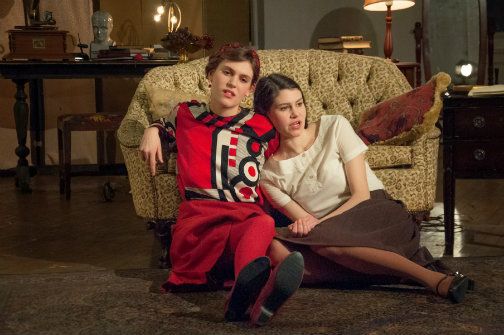Pains of Youth
By Ferdinand Bruckner, Translated by Martin Crimp; Directed by Katie Lupica
Off Off Broadway, Play Revival
Runs Through 3.2.14
Access Theater, 380 Broadway
by Adrienne Urbanski on 2.21.14
Rachel McKeon and Casey Hayes-Deats in Pains of Youth. Photo by Bailey Carr.
BOTTOM LINE: The self-destructive characters in this work are fascinating to watch thanks to strong acting performances and Bruckner's complex characterizations.
Given the plot lines and themes running through Martin Crimp's new translation of Ferdinand Bruckner’s Pains of Youth (staged by the National Theater of London in 2009) it is hard to believe that the play was penned in 1926, since it seems to be reflective of the struggles of today’s youth. The play is set in a boarding house in Vienna where six young medical students carry out their sadistic power games and look for direction in a society that seems to have fallen to pieces with political and economic uncertainty looming before them.
Pains of Youth centers around Marie (Casey Hayes-Deats), a seemingly sweet and innocent young woman who has worked hard to graduate from medical school. She initially seems to be the most together and happy of the characters and shuns off drinking in favor of thoroughly scrubbing her apartment. Her neighbor Desiree (Rachel McKeon) is an heiress who ran away from home to find adventure as a youth, but now attends medical school with little hope or ambition. She drinks excessively and has meaningless sex with men such as the depraved Freder (Jacob Trussell) and cares little for anyone, other than Marie who she openly flirts with, telling her that “only a woman knows how to love another woman.” Later she laments her available options in life by saying “Bourgeois existence or suicide, there are no other choices,” as she slips into an existential malaise.
Marie’s world is turned upside down when she discovers that her boyfriend Petrell (Danny Rivera) has left her for Irene, a cold woman who has starved her body of both affection and sustenance in order to work harder at her studies. Marie’s kind façade is ripped off as she gives into her darker nature, violently attacking Irene verbally and then physically. Worried that no one will love her, she gives in to Desiree’s sexual advances and the two play power games, both alternately needing each other and then pushing each other away. Meanwhile, the morally lacking Federer has made it his goal to corrupt the innocent maid Lucy (Lizi Myers), first by getting her to steal from the boarders and then by getting her to turn tricks in the street.
Pains of Youth is slow to begin and at first it was somewhat difficult to discern who was in a relationship with who (this problem was probably exacerbated by a loud car alarm that the poor actors had to speak over.) This is also probably due in part to an initial effort to preserve some of the original German language of the play. However, once the play moved past its slow opening the plot proved to be rife with complex power struggles and confused and corrupted characters who slowly destroy one another, and in some cases, themselves. They scrabble at finding affection, and their momentary joy only seems to lead them to fall further apart.
One thing that makes the play particularly unique is how complex the female characters are, as male playwrights sometimes seem to write women as one dimensional. All of the women differ from one another greatly, and none of them fall into the usual female stereotypes. The men as well break gender stereotypes, especially Alt (marcus d. harvey) who is the most nurturing of all the characters and the only one who does not have sexually charged motivations. The dialogue is a bit clunky and awkward at times (which is what probably happens when you adapt a script from another language, culture, and era) but the actors do an impressive job of making it sound convincing and authentic, particularly Rachel McKeon and Casey Hayes Deats. Each of the actors also succeeds in making their character’s mercurial whims and dramatic musings sound convincing, while these lines might seem like bravado in lesser hands.
Set designer Ryan Howell and prop designer Marissa Bergman also turn the large space of the Access Theater’s loft stage into what looks and feels authentically like a European apartment from the 1920s. Bruckner’s depiction of depressed and listless youth was to show the mindsets that would eventually lead to accepting Nazism and facism, but these confused youths also seem to bear a striking resemblance to the directionless youth of recent years who go to college only to find themselves without any kind of profession or future. I am guessing that this work was never well received during Bruckner’s time due to its exploration of dark and taboo subjects (including homosexuality). The power struggles and themes within Pains of Youth are highly relatable, albeit frightening, and that is what makes this a compelling production to watch.
(Pains of Youth plays at Access Theater, 380 Broadway, through March 2, 2014. Performances are Mondays, Tuesdays, and Thursdays through Sundays at 8PM. Tickets are $18 and are available at www.smarttix.com or by calling 212.868.4444. For more information visit www.painsofyouthnyc.com.)


